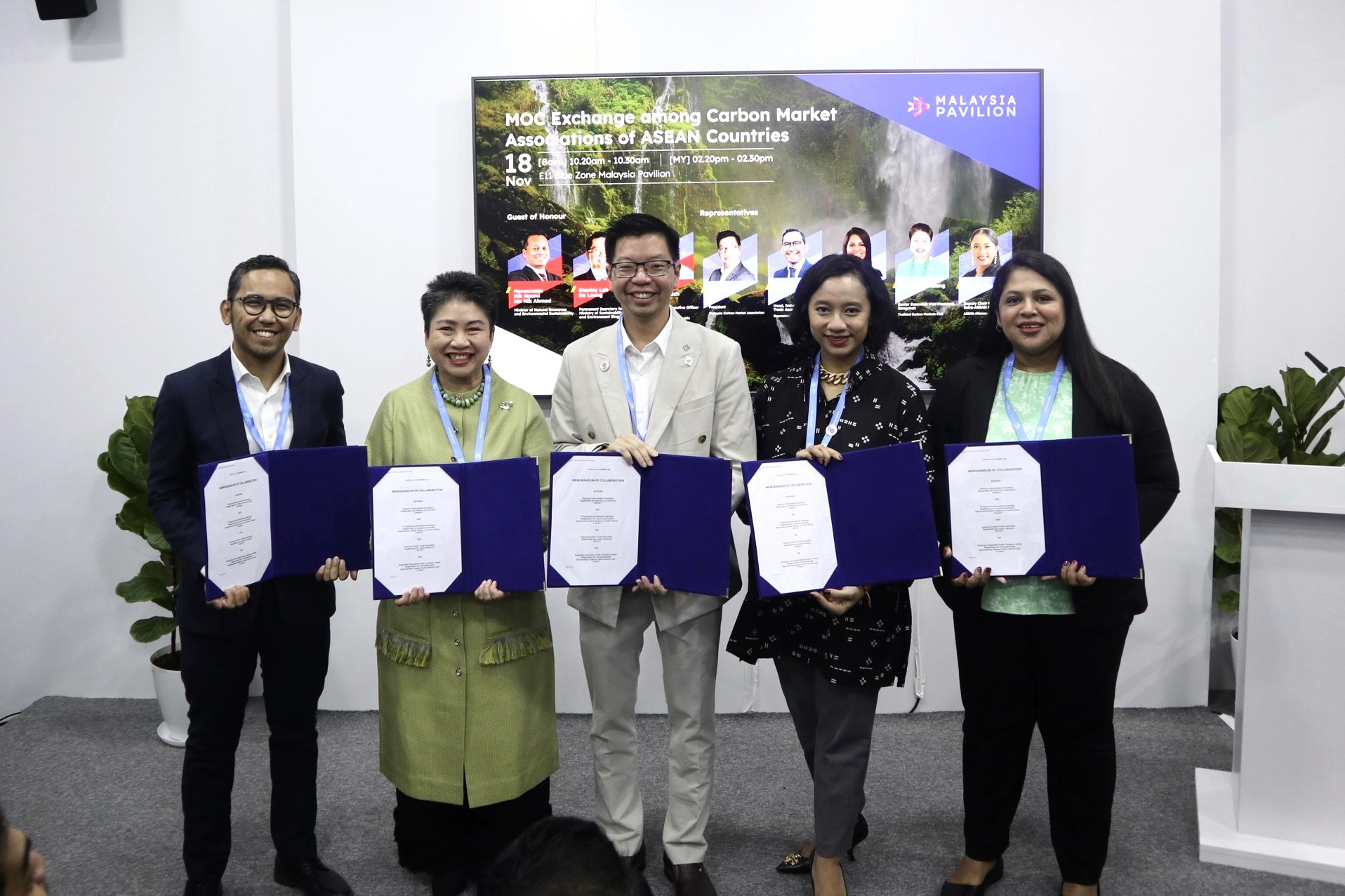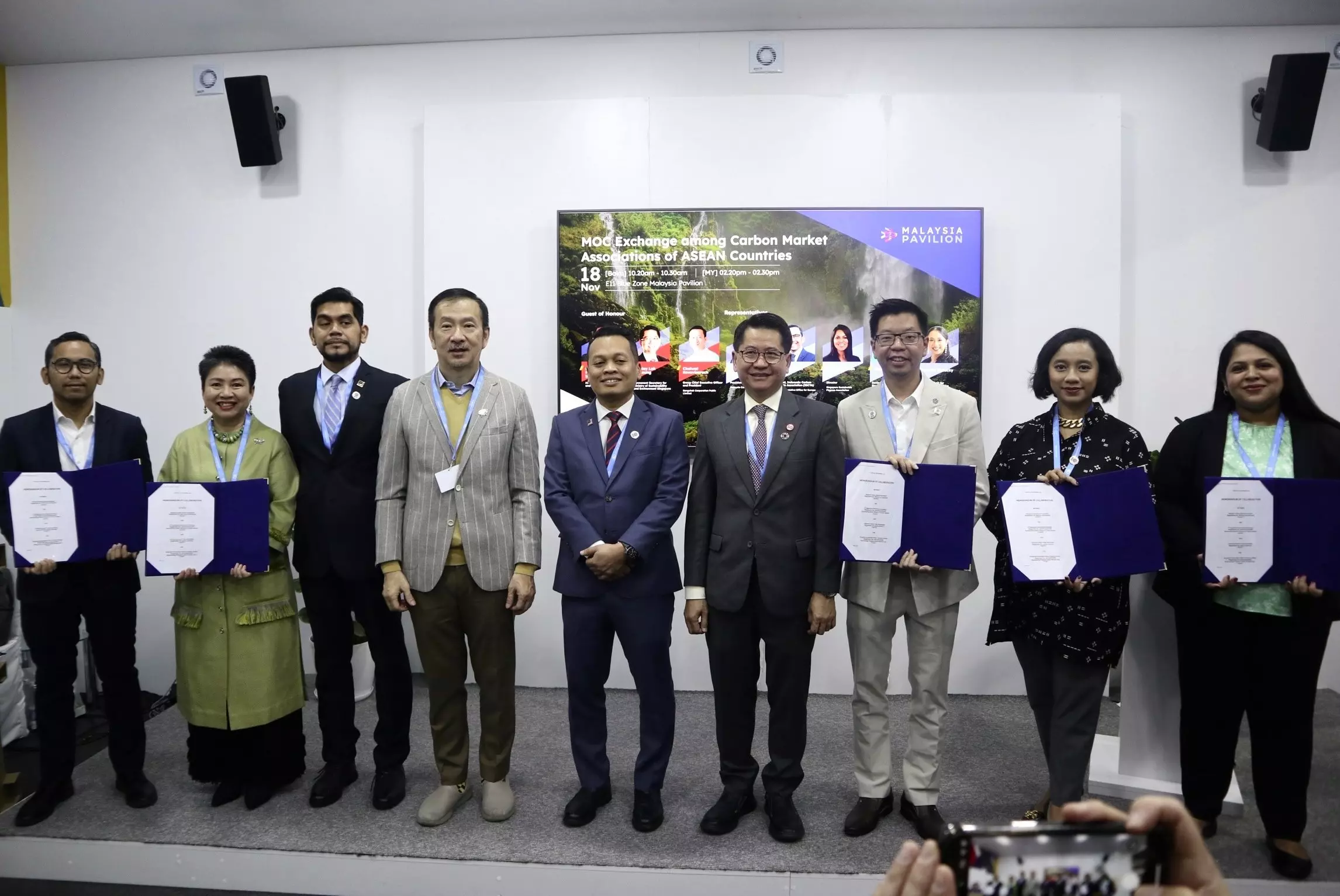COP29 Marks ASEAN’s Unified Push for Carbon Neutrality
News

At COP29 in Baku, ASEAN demonstrated its growing leadership in the global carbon market. Honourable Nik Nazmi bin Nik Ahmad, Malaysia's Minister of Natural Resources and Environmental Sustainability, set the stage with an ambitious opening keynote. He highlighted ASEAN’s potential as a collective force, with its 670 million-strong population and position as a rising economic powerhouse expected to rank fourth globally by 2030.
Malaysia, taking over the ASEAN Chairmanship next year, aims to formalize a unified strategy for carbon neutrality. A ceremonial memorandum exchange at COP29 symbolized this commitment, paving the way for accelerated low-carbon investments and deeper regional cooperation.
The ASEAN Common Carbon Framework (ACCF): A Game-Changer
At the heart of ASEAN’s strategy lies the ASEAN Common Carbon Framework (ACCF), designed to tackle the unique challenges and harness the opportunities within the region’s carbon markets. By standardizing carbon methodologies and fostering collaboration, the ACCF aims to lower costs, enhance transparency, and boost market efficiency.
Key initiatives under the ACCF include:
- Mutual recognition of methodologies: Streamlining project development across ASEAN nations. As Dr. Renard Siew stated, "Developing national methodologies takes time, and mutual recognition can accelerate the process significantly."
- Building regional talent: Cultivating a skilled workforce for validation and verification services.
- Capacity building: Fostering technical training and knowledge sharing.
The ACCF serves as a central hub for collaboration, connecting ASEAN’s carbon market associations to drive impactful projects and enhance market integration.
Today, five major carbon market associations from Malaysia, Indonesia, Singapore, Thailand, and ASEAN formalized a historic partnership at the COP29 event in Baku, Azerbaijan, with the exchange of a Memorandum of Collaboration (MoC).
The MoC was signed by the following associations:
- Malaysia Carbon Market Association (MCMA), represented by Dr. Renard Siew
- ASEAN Alliance on Carbon Market (AACM), represented by Dharsono Hartono
- Indonesia Carbon Trade Association (IDCTA), represented by Dr. Riza Suarga
- Thailand Carbon Markets Club (TCMC), represented by Gloyta Nathalang
- Singapore Sustainable Finance Association (SSFA), represented by Kavitha Menon
The MoC ceremonial exchange, witnessed by Malaysia’s Minister of Natural Resources and Environmental Sustainability, Honourable Nik Nazmi Bin Nik Ahmad, marks a significant milestone in advancing regional cooperation on carbon markets.

Photo taken by MCMA team: Signatory Members with Honorary Witnesses
Exchange of Memorandum of Collaboration (MoC) on the ASEAN Common Carbon Framework (ACCF) at Conference of Parties 29 (COP29). (L-R) Yoshan Fazri, Head of Indonesia Carbon Trading Association (IDCTA) Representative Office for Europe; Gloyta Nathalang, Senior Executive Vice President, Bangchak Corporation Plc. and Chair, Thailand Carbon Markets Club (TCMC); Mr. Ahmad Kamrizamil Mohd Riza, Ambassador of Malaysia to Azerbaijan; Mr. Chaiwat Kovavisarach, Group CEO and President of Bangchak Corporation Plc. and founder of TCMC; YB Nik Nazmi bin Nik Ahmad, Minister of Natural Resources and Environmental Sustainability of Malaysia; Mr. Stanley Loh, Permanent Secretary for the Ministry of Sustainability and Environment of Singapore; Dr. Renard Siew, President of the Malaysia Carbon Market Association (MCMA); Natalia Rialucky, Deputy Chair for Intra-ASEAN Affairs, ASEAN Alliance on Carbon Market (AACM); Kavitha Menon, Director for Singapore Sustainable Finance Association (SSFA)
Three Key Priorities for ASEAN’s Carbon Market
- High-Integrity Frameworks: Ensuring transparency and trust is paramount to ASEAN’s carbon market. By committing to high standards, ASEAN can position itself as a preferred supplier of verified, high-quality carbon credits."By acting as a region, ASEAN can show the world it strives to meet the highest integrity standards," said Natalia Rialucky, CEO & Founder of Fairatmos
- ASEAN-Specific Methodologies: ASEAN’s vast standing forests hold immense potential for avoidance credits, which are often undervalued. The region must champion methodologies that prioritize conservation to meet climate goals."Protecting standing forests is as crucial as replanting new ones," noted Frederick Teo.
- Unlocking Financing: Innovative financing solutions are critical to scaling ASEAN’s carbon projects. By leveraging domestic funding and blended finance models, ASEAN can mitigate risks and create scalable success stories.
The Importance of Inclusivity
Inclusivity underpins ASEAN’s carbon market vision. From governments to local communities, every stakeholder has a role in creating sustainable projects.
Layers of inclusivity include:
- Regional collaboration: Supporting ASEAN nations at varying stages of carbon market development.
- National partnerships: Encouraging collaboration between governments and private companies.
- Community engagement: Empowering local communities and NGOs to lead and sustain projects.
Policies and Infrastructure: The Backbone of Progress
Robust policies and streamlined infrastructure are essential to ASEAN’s carbon market success. Governments must focus on:
- Supply integrity: Ensuring projects deliver measurable, real-world impacts.
- Demand-side incentives: Encouraging corporates to invest in conservation projects.
- Market infrastructure: Simplifying trading and financing processes.
Join ASEAN’s Climate Action Today
ASEAN’s unified approach to carbon neutrality is a call to action for everyone. Whether you’re a corporate leader, a policymaker, or an individual, you can play a role in driving impactful climate action.
Take the next step with Fairatmos. Start your carbon project or offset your emissions today. Together, we can build a sustainable future.
Visit our website or 📩 contact us to learn more!
